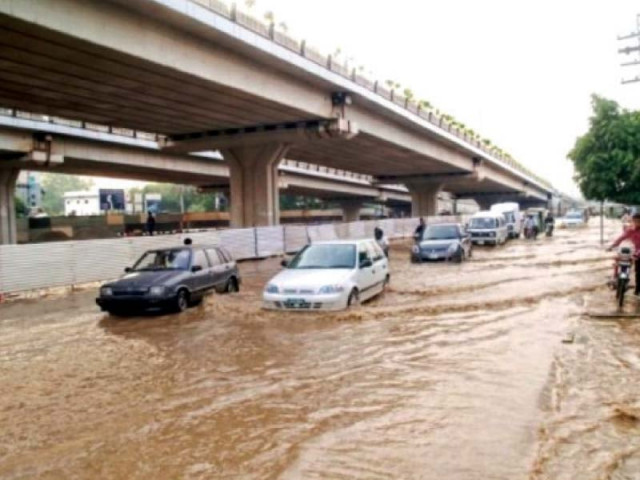No escape from disasters
Natural disasters are something that are inevitable in Pakistan
Vehicles struggle to move along the flooded Muree Road in Rawalpindi. PHOTO: FILE
Natural disasters are something that are inevitable in Pakistan. So are they in many other countries, but their vulnerability and the consequences of natural disasters are mitigated by effective pre-planning. For Pakistan, poor governance, corruption, an already weak infrastructure and a chronic inability to implement policies, which reduce risk all aggregate to an artificially heightened vulnerability. Plainly put, we could do a lot better at helping ourselves than is currently the case. This is exposed in data compiled by Verisk Maplecroft, which is a UK-based risk-management company. Pakistan ranks at seven out of the top 10 countries whose populations are acutely exposed to natural disasters. Around 136 million, a startling 70 per cent of our population, are exposed to the range of natural hazards and calamities, which often happen, as in the case of large earthquakes, with no warning whatsoever. With spring rains already having taken their toll in the north and west of the country, we face another year in which flooding of catastrophic proportions is a near certainty. Many areas have not recovered from the floods of previous years, and there are still families living in tented accommodation in the wake of the 2005 earthquake. Flooding is our biggest problem, with 10 million exposed to acute risk and it is only ever going to get worse as global warming affects rainfall pattern and volume. The report notes that in countries such as India, Pakistan and Bangladesh, there are building codes in place, often rudimentary, but everywhere poorly implemented. Construction continues on floodplains and mountainsides liable to subsidence if they become waterlogged, a far from rare occurrence. Urban planning in Pakistan is often piecemeal or indeed wholly absent, the cities expanding laterally with little regulation or thought for how they will be affected by extreme weather events. Endemic corruption feeds through into a lack of disaster preparedness, and the unfortunate reality is that unless and until known and endemic deficits are rectified, the cumulative effects of natural disasters will only multiply. Self-inflicted wounds are the slowest to heal.
Published in The Express Tribune, March 28th, 2016.
Like Opinion & Editorial on Facebook, follow @ETOpEd on Twitter to receive all updates on all our daily pieces.















COMMENTS
Comments are moderated and generally will be posted if they are on-topic and not abusive.
For more information, please see our Comments FAQ